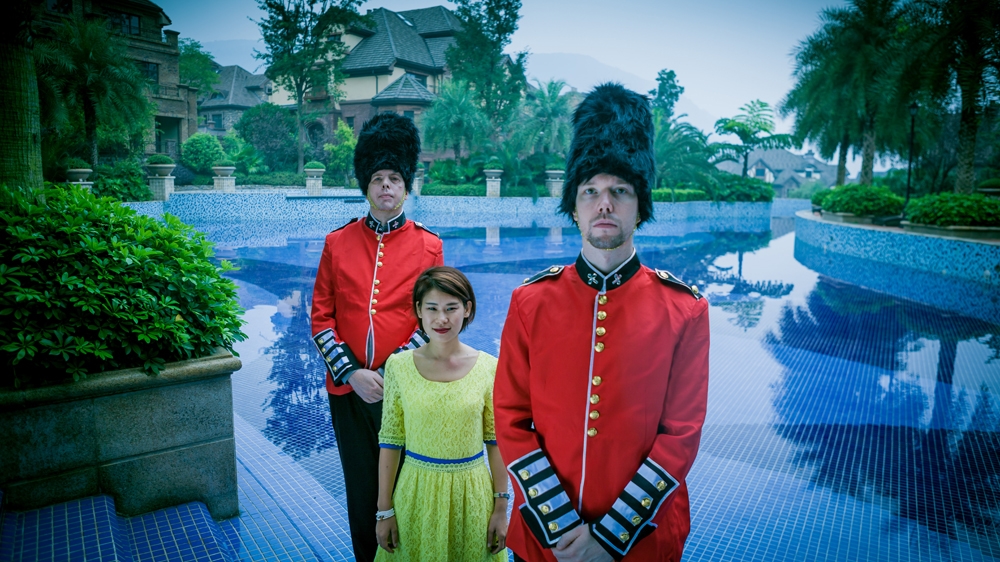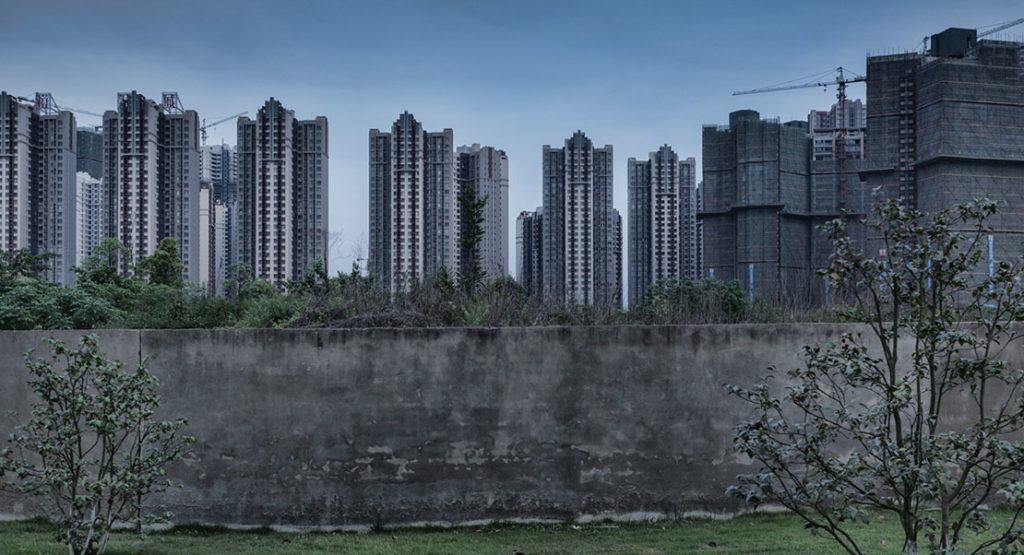![]()
Deep Diver is an Elephant Room column for stories that got lost in translation. Each week, we'd pick a batch of the most interesting and relevant content from an ocean of Chinese sources, translate and serve them to you.
It's almost like an buyer's boutique for Chinese content: Elephant Room does the sourcing, you sit back, read and enjoy.
![]()
Original Article: 这个美国人拍了一部电影,记录白人在中国靠脸吃饭的“白猴子”行业
-Source: Qdaily好奇心日报
-Author: 温欣语
-Translator: George Hu 虫洞翻翻
![]()
We both watched Dream Empire after reading this article and were deeply fascinated by this boom to bust tale set in China's building boom (Which has slowed down, but still not stopped yet).

Photo from: aljazeera
1.
One day in 2012, when David Borenstein from Miami, USA was hanging out near Jiuyan Bridge, Chengdu, a couple of agents came to ask him whether he had any talents or skills and invited him to perform in a show. That was David’s second year in Chengdu, but he had already received countless invitations. Out of curiosity, he decided to give it a try.
Soon after his first show, David was invited to play the clarinet in the opening gig for a new real-estate project in Chengdu. Since he had never touched a clarinet before, he could only pretend to be playing. Several other foreigners were also performing together with him on the stage, and they had only one thing in common: white skin.
After the gig, they were led to a banquet hall where a forum was being held. There an emcee in formal suit was introducing a “famous architect” who was about to get on the dais. After the event, David talked with him and found that, exactly like his own experience, this architect was found on the street and paid to come playing an assigned role.
That was how David, a Fulbright Scholar who was doing research in anthropology in Sichuan province, entered the “white monkey performance” industry as called by locals. In the end of 2016, David premiered his documentary Dream Empire based on his two years of “white monkey” experience in China. The film starts with Yana, a girl in her early 20s who just opened up the biggest local foreigner-hiring agency in Chongqing. Her business was quite simple: “As long as foreigners (laowai) are there, we will have business. Developers are building a lot of houses in the city which needs to be sold, and with our Laowai, they sell faster.” said Yana in a joking manner.

David shot the documentary Dream Empire while working as a "white monkey performer" in Chongqing.
2010 was indeed the year when the Chinese real estate industry was booming, which, as David commented in the film, was one of the most dramatic urban developments in the 21st century.
David believes that “white monkeys” in his documentary was a powerful force that played significant roles in this urban boom. “In a city undergoing such rapid change, we the foreigners were interpreted as a vivid symbols of internationalization, urban construction and high-quality western way of life”.
Their jobs seemed quite easy. In most cases, “white monkeys” need to play a certain role. Sometimes one is paid 1000 to 1500 yuan to sing a song. David once met a French backpacker in Chengdu, who had lived in this city for five years. This man only needed to play a bass guitar player four times a month, and spent rest of his time attending bass guitar classes. Now this French guy is known in Chongqing as a professional musician from Paris.
2.
David is a “white monkey” with his own title. He is the “world-renowned clarinetist David Borenstein” that belongs to a “famous American band”. The hiring company even took professional photographs specially for him, in which he held a clarinet, wearing a turtleneck and a tweed suit. “Very ridiculously stupid”, said David.

David's "professional musician" shoot. (Photo from: Qdaily)
But David’s identities are more than just a musician. In fact, he could play whatever roles as required by the real estate developers or gig organizers.
Once a developer in Xi’an wanted him to play an US consular official, and to make a remark in the opening ceremony that the U.S president Barack Obama strongly supports this project. The developer even planned to prepare a “photo of U.S Consulate ID”- luckily, the project fell through.
Generally speaking, David’s acting career went fairly smoothly. With more and more real estate projects coming up in the city, the demand for foreigners also skyrocketed: agencies would send their men to nightclubs and bars to look for suitable foreigners, and they looked for only one thing: appearance. After interviews with lots of performers, David found that those with blue eyes and blond hairs are often paid the most, while the blacks or those with darker skin are paid two-thirds less, “it all depends on appearances and races.” David recalled.
Discrimination even existed among the whites. A country-music singer, one of David’s friends, happened to find a theme musical activity “Night of Country” when he visited Chengdu. He believed that he finally had the chance to perform at a gig. But the planner did not like his appearance, and instead chose a good-looking white lady who could not sing at all. “Whether you are talented or not, you are suitable as long as you look like (good-looking) westerners.”
3.
In the year David met Yana, the foreigner hiring market in Chengdu was getting saturated, and Yana was about to open up a white-people hiring company in Chongqing.

Yana, the "white monkey"manager girl who worked with David. (Photo from: houseofreal)
Yana once undertook a project for an “International Water Sports Game” held in a small town in Chongqing. The town hoped to boost local tourism with the help of the Game. Things became quite easy under the logic that “a large number of whites mean internationalization”: Yana rented a bus that carried 30 foreigners including David to the town, and held an opening ceremony comparable to the Olympics: “international athletes”, performed by David and other foreigners, entered the arena successively, holding their national flags, and an official on the other side was reading his speech draft aloud: “throughout the history of sports development of our town, today is the day that makes us extremely proud…”
David can still remember the faces of the audience, most of whom were local villagers.
Similar kinds of projects with government and real estate developers constituted most of Yana’s business then. Of course high profits were taken for granted, but actually the competition was much more fierce than Yana had imagined. Whether she could “win the tender” depended on her social connections. Even if the foreigners she recommended were selected, the profits would be shared with other partners and event organizers. Yana managed to sustain her business until 2014, when both the real estate market and the fetishization of internationalism started to cool down in China.
4.
Today, the “white monkey” hiring market in China still exists, but the game rules have become crueler.
Accosting in the street is much less than before. Hiring companies would visit YouTube and select good-looking Russians and Ukrainians online. After they are sent to China, they shall sign long-term service contracts with their passports taken away. In this case, interests are becoming less and less for each side.
“White monkeys” also appear in more industries than real estate, which no longer provides well-paid offers. For example, you often see white faces in billboards on highways or in airports, and the majority of them are foreign English teachers in China, or just ordinary Joes found by “scouts” in the street.
Every time David goes back to America, he enjoys sharing his “white monkey” experience with friends, “they feel shocked and totally can’t understand, as it is so crazy to them”.
David knows that to really understand the White Monkey business, one must know what is behind the scene: the culture, politics, official speeches and the fascination with GDP growth. That is the reason why he shot Dream Empire.
“Chinese officials and businessmen make people believe that cities are developing rapidly,” said David, “But the reality is just an empty bubble.” His experience in China has shown him the great potential in this society, a place that could employ such huge social power to boost real estate at the price of poor infrastructure and ghost towns. David often asks himself: “What if the same energy is invested in something more meaningful, like treating cancers or saving the environment?Why are we spending time constructing empty cities like these?”

Photo from: houseofreal
You can watch the trailer of Dream Empire here or watch the documentary here.

Unbeknownst to both him and Yana at the time, all those empty promises were creating a housing bubble on the brink of bursting. Borenstein spoke with CityLab to describe his experience as a foreigner for hire.